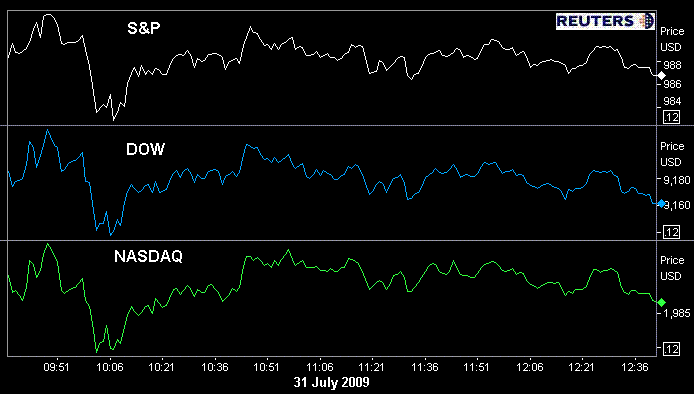Market reaction has been mixed since it was confirmed that second-quarter GDP contracted at a much slower pace than the in the prior quarter. The data suggests the recession is coming to an end, but the view ahead is far from clear and rosy.
Although stock indexes look ready to end the week up more than 1%, following a huge 11% gain in the prior two weeks, the weekly gain is based on the advance seen yesterday, as stocks are roughly flat two hours into Friday’s session.
Three hours into the trading session, the S&P 500 is trading 0.13% higher at 986, while the Dow is up 0.10% at 9163, and the Nasdaq is up 0.15% to 1987.

In fixed income markets, the 10-year yield is 8 basis points lower at 3.52%.
The GDP report had good points and bad ones. The good news was the headline: gross domestic product contracted at an annual rate of just 1% in Q2.
The bad news came in revisions to prior data: Q1 contracted by 6.4% instead of the -5.5% print reported earlier. Moreover, the growth rate for 2008 got downwardly revised to +0.4% from +1.1%.
“In the past year, the economy contracted 3.9%, the sharpest decline in at least 47 years, and shrank for four straight quarters, also a postwar record,” noted Sal Guatieri, senior economist at BMO Capital Markets.
Many analysts also pointed out that Q4 2007 to Q4 2008 was significantly downgraded to a growth rate of -1.9% versus an original estimate of -0.8%.
Looking ahead, sentiment is mixed.
“We’re in a deep hole, and now we’ve got to dig ourselves out of it, which is a very difficult task,” said Diane Swonk, chief economist at Mesirow Financial.
Virtually all economists agree that the bottom has been reached, but they also agree that recovery will be a grueling process as consumers shift emphasis from spending to saving while they readjust to softer household wealth. Meantime, the unemployment rate is expected to keep rising for some time, even as GDP is expected to improve in the current quarter.
“Positive growth alone will not mean the end of the recession; we will need to see a significant improvement in the labor market and industrial production,” said Joseph LaVorgna from Deutsche Bank. “But if an inventory led recovery is underway, the latter two factors should show signs of improvement over the course of this quarter and Q4.”
He added: “Next week’s July employment report will likely garner acute scrutiny as the markets watch for evidence that the labor market decay is abating.”
In more recent data, the Chicago Business Barometer, an influential index of the Midwest region, rose several points to 43.4 in July. That’s well below the 50-level needed to indicate growth, but it’s the second straight improvement, which bolsters claims that the third quarter will see growth.
“This is a strong report and we find it encouraging to see the index continue to stage gains after posting an all time low in March,” commented TD strategist Ian Pollick, noting the March reading was 31.4.







